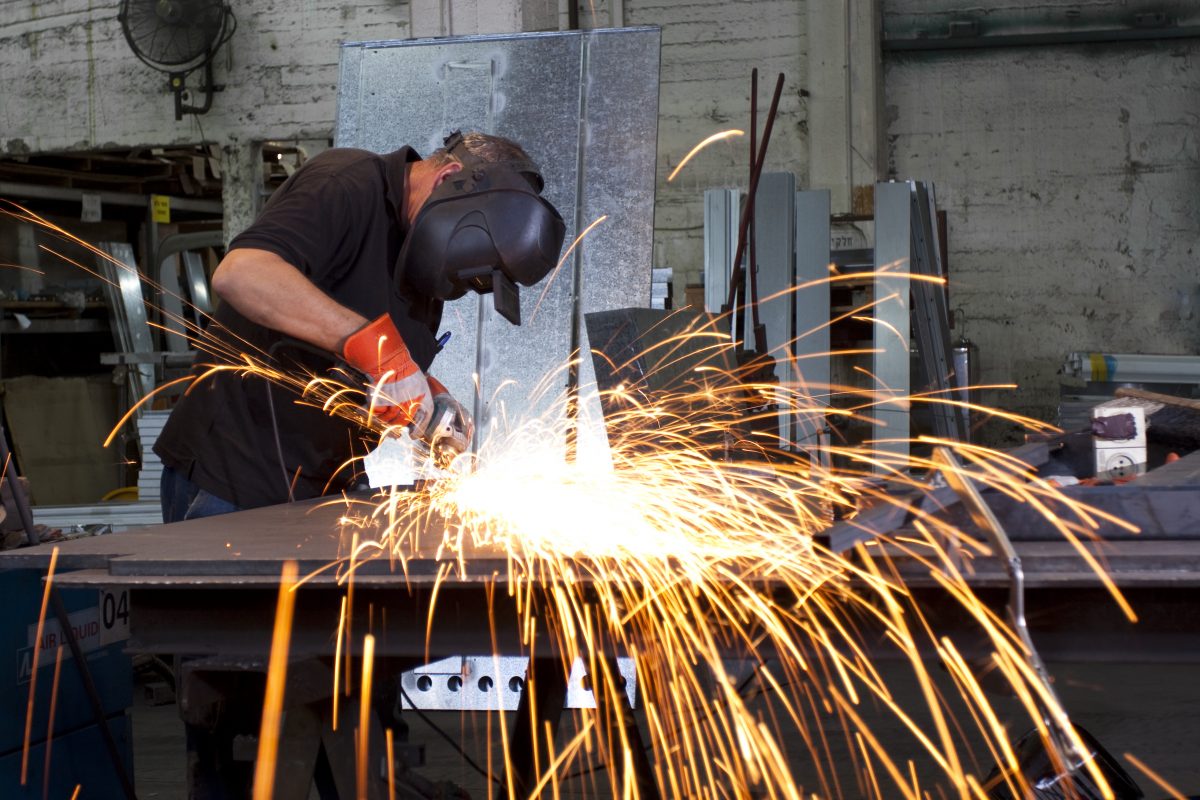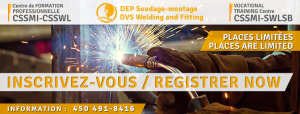Welding and Fitting


1800 hours – 60 weeks – Offered in a bilingual format at the Construc-Plus Vocational Centre in St-Eustache
Next cohort: August 29, 2022
Program objectives
To acquire the qualifications needed to get into the labour market; to acquire the qualifications needed to interpret plans, specifications and procedures; to acquire the qualifications needed to prepare and weld steel, stainless steel and aluminum parts according to different processes: SMAW, CTAW, GMAW, FCAW; to acquire the qualifications needed to carry out, modify and repair assemblies; to apply occupational health and safety rules; to control the quality of products built.
Admission conditions
To be eligible for admission to this program, candidates must meet one of the following requirements:
Persons holding a Secondary School Diploma or its recognized equivalent, for example, an Attestation of Equivalence of Secondary V studies, or a postsecondary diploma such as the Diploma of College Studies or a Bachelor’s degree
OR
Persons who are at least 16 years of age on September 30 of the school year in which their training is to begin and have earned the Secondary IV credits in language of instruction, second language and mathematics in the programs of study established by the Minister, or have been granted recognition for equivalent learning
OR
Persons who are at least 18 years of age upon entry into the program and have the following functional prerequisites: the successful completion of the General Development Test (see the following table), or recognition of equivalent learning
OR
Persons who have obtained Secondary III credits in language of instruction, second language and mathematics in programs established by the Minister are required to pursue general education courses, concurrently with their vocational training, in order to obtain the Secondary IV credits they lack in language of instruction, second language and mathematics in programs established by the Minister.
Targeted professions (Link to Emploi Québec’s IMT En ligne)
Welders and related machine operators (7237)
Functional prerequisites
A person who has reached the age of 18 can be admitted to a program of study leading to a Diploma of vocational studies (DVS) based on functional prerequisites. These prerequisites, in place for those aged at least 18 years at the start date declared for the vocational training program, are: successful completion of the general development test (GDT) and obtaining and passing the tests relative to the specific prerequisites in the language of instruction and mathematics, if applicable.
This table indicates the new course codes for common core basic education (CCBE) and diversified basic education (DBE) required for the specific prerequisites in language of instruction and mathematics for the targeted program of study. In the cases where the new course codes for the CCBE and the DBE are in progressive implementation, the old codes are indicated in parenthesis and are still valid. The equivalent course codes in basic education in the youth sector are also indicated in the table. When a DVS does not require any specific prerequisites in language of instruction or in mathematics, a (-) will be displayed in the appropriate field. Please note that the functional prerequisites do not apply to attestation of vocational specialty (AVS) programs.
Specific prerequisites
Language of instruction
Mathematics
Adults
Youth
Adults
Youth
3101-1 3102-2 (3070-3)
632-306
3053-2 (3016-2)
063-306 563-306
Program content
Statement of competency
Determine their suitability for the trade and the training process
Become aware of occupational health and safety rules
Produce sketches and drawings
Apply concepts of metallurgy
Interpret drawings and specifications
Cut ferrous and non-ferrous metals
Use cutting and shaping equipment
Prepare parts
Apply the SMAW process
Weld steel parts using the SMAW process
Apply the GTAW process
Weld steel parts using the GTAW process
Weld aluminum parts using the GTAW process
Produce basic assemblies
Apply the GMAW process
Weld steel parts using the GMAW process
Weld aluminum parts using the GMAW process
Produce simple assemblies
Apply the FCAW process
Weld steel parts using the FCAW process
Apply the SAW, RW and PAW processes
Interpret drawings and specifications for complex assemblies
Produce assemblies of medium complexity
Communicate in the workplace
Produce complex assemblies
Modify assemblies
Repair assemblies
Use job-search techniques
Enter the work force

1800 hours – 60 weeks – Offered in a bilingual format at the Construc-Plus Vocational Centre in St-Eustache
Next cohort: August 29, 2022
Program objectives
To acquire the qualifications needed to get into the labour market; to acquire the qualifications needed to interpret plans, specifications and procedures; to acquire the qualifications needed to prepare and weld steel, stainless steel and aluminum parts according to different processes: SMAW, CTAW, GMAW, FCAW; to acquire the qualifications needed to carry out, modify and repair assemblies; to apply occupational health and safety rules; to control the quality of products built.
Admission conditions
To be eligible for admission to this program, candidates must meet one of the following requirements:
Persons holding a Secondary School Diploma or its recognized equivalent, for example, an Attestation of Equivalence of Secondary V studies, or a postsecondary diploma such as the Diploma of College Studies or a Bachelor’s degree
OR
Persons who are at least 16 years of age on September 30 of the school year in which their training is to begin and have earned the Secondary IV credits in language of instruction, second language and mathematics in the programs of study established by the Minister, or have been granted recognition for equivalent learning
OR
Persons who are at least 18 years of age upon entry into the program and have the following functional prerequisites: the successful completion of the General Development Test (see the following table), or recognition of equivalent learning
OR
Persons who have obtained Secondary III credits in language of instruction, second language and mathematics in programs established by the Minister are required to pursue general education courses, concurrently with their vocational training, in order to obtain the Secondary IV credits they lack in language of instruction, second language and mathematics in programs established by the Minister.
Targeted professions (Link to Emploi Québec’s IMT En ligne)
Welders and related machine operators (7237)
Functional prerequisites
A person who has reached the age of 18 can be admitted to a program of study leading to a Diploma of vocational studies (DVS) based on functional prerequisites. These prerequisites, in place for those aged at least 18 years at the start date declared for the vocational training program, are: successful completion of the general development test (GDT) and obtaining and passing the tests relative to the specific prerequisites in the language of instruction and mathematics, if applicable.
This table indicates the new course codes for common core basic education (CCBE) and diversified basic education (DBE) required for the specific prerequisites in language of instruction and mathematics for the targeted program of study. In the cases where the new course codes for the CCBE and the DBE are in progressive implementation, the old codes are indicated in parenthesis and are still valid. The equivalent course codes in basic education in the youth sector are also indicated in the table. When a DVS does not require any specific prerequisites in language of instruction or in mathematics, a (-) will be displayed in the appropriate field. Please note that the functional prerequisites do not apply to attestation of vocational specialty (AVS) programs.
| Specific prerequisites | |||
| Language of instruction | Mathematics | ||
| Adults | Youth | Adults | Youth |
| 3101-1 3102-2 (3070-3) | 632-306 | 3053-2 (3016-2) | 063-306 563-306 |
Program content
| Statement of competency | |||
| Determine their suitability for the trade and the training process | |||
| Become aware of occupational health and safety rules | |||
| Produce sketches and drawings | |||
| Apply concepts of metallurgy | |||
| Interpret drawings and specifications | |||
| Cut ferrous and non-ferrous metals | |||
| Use cutting and shaping equipment | |||
| Prepare parts | |||
| Apply the SMAW process | |||
| Weld steel parts using the SMAW process | |||
| Apply the GTAW process | |||
| Weld steel parts using the GTAW process | |||
| Weld aluminum parts using the GTAW process | |||
| Produce basic assemblies | |||
| Apply the GMAW process | |||
| Weld steel parts using the GMAW process | |||
| Weld aluminum parts using the GMAW process | |||
| Produce simple assemblies | |||
| Apply the FCAW process | |||
| Weld steel parts using the FCAW process | |||
| Apply the SAW, RW and PAW processes | |||
| Interpret drawings and specifications for complex assemblies | |||
| Produce assemblies of medium complexity | |||
| Communicate in the workplace | |||
| Produce complex assemblies | |||
| Modify assemblies | |||
| Repair assemblies | |||
| Use job-search techniques | |||
| Enter the work force |

